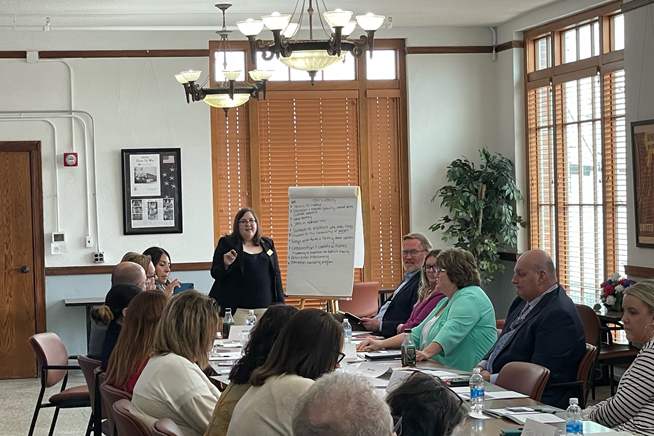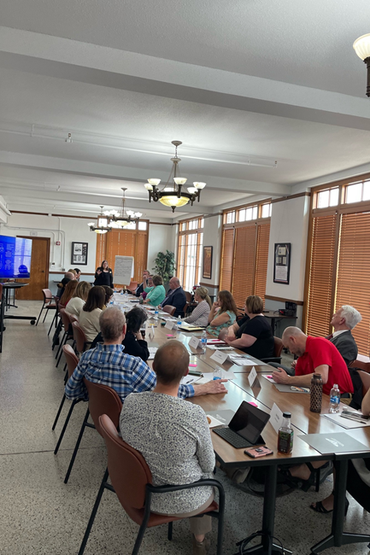Subject: Connection request
Hello! My name is Rachael Surmick and I am a new community development advisor
with the Federal Reserve Bank of Kansas City in the Omaha branch. I recently joined
the Bank, and I’m hoping to connect with organizations that serve lower-income
communities and households to better understand issues affecting these communities
across Nebraska. Would you be willing to connect with me?
I joined the Bank in October, and I have written some variation of that email approximately 75 times in my first eight months at the Kansas City Fed. As a result, I have had the joy and honor of connecting with a myriad of organizations that support lower-income Nebraskans on their path to full financial inclusion.
But first, some exposition…
My first project as a community development advisor is to better understand the challenges facing lower-income communities across Nebraska, as well as what is already working to increase economic opportunity. What I learn will influence future community development efforts the Kansas City Fed undertakes in Nebraska. It is still a working title, but for now let’s call this project the Nebraska Community Development Landscape Assessment.
Thus the “Connection request” email was born.
My goal is to connect with organizations working in the community development, economic development, and to some extent the social and human services spaces, across the entire state of Nebraska. Prior to joining the Bank, my work focused on Lincoln, Neb. Now, I intentionally want to understand issues affecting lower-income Nebraskans in both rural and urban communities.
I began in December. Because of the constant threat of snow and ice, I started close to home with many of my former colleagues working in Lincoln. In the new year I began reaching out to organizations in the Omaha metro and have now begun in earnest to reach out to organizations across the entire state.

A recent roundtable in Nebraska City identified opportunities and challenges facing lower-income communities.
Guiding approach puts strengths at the center
I’ve built the framework for the landscape assessment around three key components. Methodologically, I am using principals of qualitative research, focusing primarily on key informant interviews and roundtable conversations. In both venues, the questions focus on the same ideas:
- What is going well to support lower-income communities and where are there opportunities to increase financial and economic opportunities?
- What are the challenges for lower-income communities?
- What are the issues that impact these communities that do not get discussed enough?
One-on-one and group conversations use a blended approach of appreciative inquiry (a strength-based change model) and asset-based community development. These approaches are complementary. Both use existing strengths to address challenges. They also recognize that residents and communities know their own communities best, which is a deeply held value that has consistently guided my work.

Nebraska City turned out for a conversation about their community with Rachael Surmick.
Nebraskans prove surprisingly eager to connect
This project is still in process. So far, I have met with more than 50 community leaders and hosted two community roundtables. The most exciting initial takeaway is just how excited people are to have this conversation. Admittedly, when I began my outreach, I expected many email recipients to not have the time to speak with me or not consider it a priority, considering how much work there is to be done. I enjoyed being proved wrong. I will never forget the executive director of an organization I spoke with in Sarpy County who said, “Thank you for having this conversation with us,” and genuinely meant it. Many organizations were excited to learn about the Kansas City Fed’s interest in lower-income communities.
Nebraskans identify many strengths and some common challenges
While this is not a surprise, Nebraska communities are doing some amazing things to support lower-income residents and create economic opportunity. For example, at a roundtable conversation in Nebraska City, the group started discussing what was going well to support lower-income communities. Once they got started, though, it was hard to redirect the conversation to the next topic because there were so many community strengths for them to identify. Time and time again, I have heard about the many ways Nebraskans are working on the local, regional, and statewide levels to remove barriers to economic inclusion.
With that said, I have heard a few key themes around challenges that prevent full financial inclusion and opportunity:
- transportation,
- the disproportionate impact of inflation on lower-income communities,
- availability and quality of affordable housing inventory, and
- availability and affordability of childcare.
Urban or rural, these issues show up in nearly every conversation. Even if the impact and challenges look different, the themes remain the same.
Watch this space for findings early in 2025
In the first quarter of 2025, we plan to release a report to the community about key findings from my tour across Nebraska, in much more detail than I have provided in this amuse-bouche. We will focus on the challenges and gaps, of course. Most importantly, though, I hope to shine a light on what is already working to support lower-income communities: the innovation, the collaboration, the resiliency. Our strengths provide us the tools we need to dig in and increase financial and economic inclusion, and there are many strengths imbedded across the state.
Until then, I have more roundtable conversations scheduled across Nebraska. I am grateful to have community organizations that willingly partner with me to host. This speaks to the strength of residents and community leaders working to increase the economic well-being of all Nebraskans.
I am also continuing my individual conversations. If you have not received that “Connection request” email and have thoughts to share, you should get in touch with me at Rachael.Surmick@kc.frb.org. I look forward to hearing from you.
